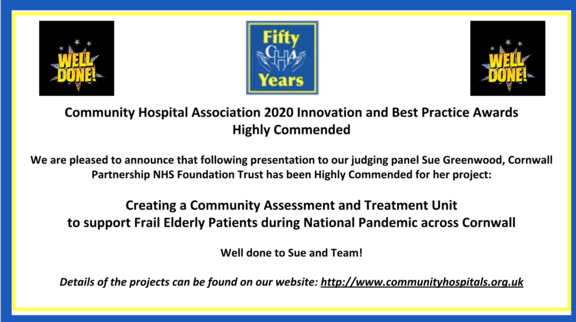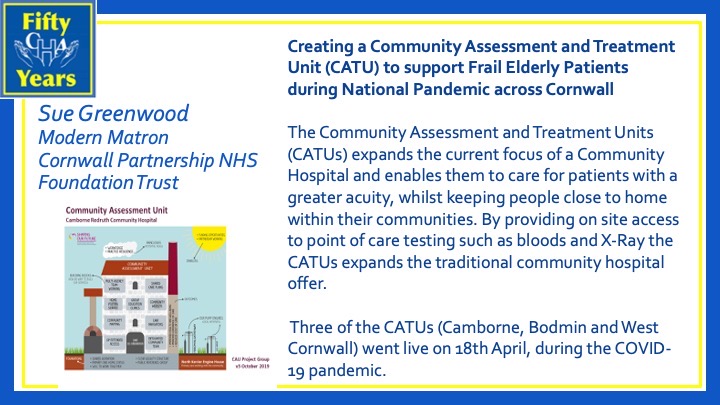Creating a Community Assessment and Treatment Unit to support Frail Elderly Patients during National Pandemic across Cornwall
Sue Greenwood
Modern Matron
Cornwall Partnership NHS Foundation Trust
Highly Commended in 2020 CHA Innovation and Best Practice Awards
Summary:
The CATUs have now been live for 5 months throughout the COVID-19 pandemic. Therefore, it is challenging to fully attribute outcomes to the CATUs; however, we have seen some positive changes in our system. From a staff perspective we have received positive feedback that nurses feel they are able to undertake skills and training they have not been able to use for a number of years. The ability to see and treat more acute patients close to home is regarded by all staff as a positive step for the CATUs. Our patients as a result of the CATUs are being seen closer to home and ideally are being assessed and treated within 72 hours, reducing unnecessary admissions to the acute trusts. With the aim of reducing length of stay for our frail elderly population we anticipate this to provide financial benefits for our system. There is also an anticipated cost reduction in transferring patients closer to where they live in terms of transport costs.
The model has been well received. Regular meetings with staff are developing the long-term workforce model in response to data and demand for the units. This is helping to optimise their use and refine and improve the patient pathway. Patient feedback has been very positive and comments included: “My stay on Harbour Ward was very good because I got the best treatment and went home to be with my wife.” Families have also responded positively regarding the end of life wishes, which were made possible.
Throughout the CATU development we have been capturing and responding to feedback from patients, referrers and staff. We are also in the process of developing a CATU specific patient survey to ensure we are capturing their views of this new service accurately.
Background:
The CATU were an initial first discussed between health, social and voluntary care professionals in the North Kerrier Primary Care Network (PCN). This group researched national and international Community Hospital models and started to develop this concept further. When the COVID-19 pandemic hit it expedited the CATUs which became live in April 2020. This initial not only started in April 2020 in Camborne Redruth Community Hospital (CRCH) but also in Bodmin Community Hospital (BCH) and West Cornwall Hospital (WCH). After the first few weeks of going live with this model the health and social care system across Cornwall were interested in developing this as an Integrated Care Area (ICA) approach and in conjunction with St Austell Health Care were able to open a further unit in St Austell Community Hospital (SACH).
Initially a group from across all of the organisations involved met weekly to hold Project Group and review clinical cases/ patient journeys to improve pathways and share learning to improve practice. These groups have continued through the pandemic and continue to meet bi-weekly to strengthen the great work of the CATUs. The group use Microsoft Teams as a way of sharing information. The CATU Project is open to feedback from all involved and shares widely all learning and documentation to help others develop.
As the model evolves there have been wider discussions about how we can spread our learning and the development of the CATUs further. For example, we are looking at how the development of the Urgent Treatment Centres (UTCs) can strengthen the CATU model further with greater access and onsite availability of diagnostics such as X-Ray and CT Scanners.
Description:
The Community Assessment and Treatment Units (CATUs) expands the current focus of a Community Hospital and enables them to care for patients with a greater acuity, whilst keeping people close to home within their communities. By providing on site access to point of care testing such as bloods and X-Ray the CATUs expands the traditional community hospital offer.
Three of the CATUs (Camborne, Bodmin and West Cornwall) went live on 18th April, during the COVID-19 pandemic. The CATUs have been developed through the pandemic in with a test and learn approach. Our teams have responded promptly to feedback received and adapted ways of working within extremely short time frames. In response to further feedback from colleagues across our health and social care system we also implemented a fourth CATU at St Austell to provide a CATU service in each of our three Integrated Care Areas (ICAs).
Our Community Hospitals in Cornwall currently use paper documentation. At the start of this project we engaged data teams from across Cornwall Partnership Foundation Trust and Royal Cornwall Hospital Trust. Within a few days we had created a mechanism to record the types of admissions to the CATUs to create a dashboard for our reporting. We have also developed a KPI dashboard for the CATUs which are viewed across the system as an integrated area, rather than silo organisations. Although, like many things we cannot fully attribute the data to the CATUs our range of KPIs within our dashboard provide a robust picture of the system to understand our impact to some extent.
Aims:
- Reduce mortality by providing appropriate clinical care for those affected by COVID 19
- Ensuring continuity of essential health and social services
- Protecting clinicians and vulnerable people
- Mitigate some of the disruptive effects of COVID 19 e.g. shielding, social distancing and movement restrictions, to minimize the negative health impacts.
Objectives:
- Reduce the number of unplanned care episodes in adults with frailty syndrome [meeting CATU criteria] presenting at emergency departments
- Increase the number of frail adult patients managed within the community
- Reduce the number of inpatient days that frail, adult patients [meeting CATU criteria] spend in hospital
- Reduce real [total] cost of providing care to frail adults
- Develop services and skills to support primary care networks to manage care as close to home as possible
We are unable to quantify if patient experience has improved as a result of this integrated working as our surveys have changed from this year compared to previous years. However, we anticipate by reducing length of stay and ensuring frail patients are able to return to their home that patient experience is improved as a result. The CATU video (Appendix X) supports this through a patient discussing their experience.
A month after the CATUs went live feedback workshops were undertaken with staff on the CATUs at Bodmin, Camborne and West Cornwall Appendix Y demonstrates all the positive elements captured by staff about this way of working. Each CATU aims to undertake staff surveys on a quarterly basis. The last survey undertaken in June 2020, reported that 88.3% are satisfied with their roles.
The ethos of the CATUs is about multi-agency working to achieve optimum patient outcomes. Whilst centring on MDT working the team supporting patients includes a variety of professionals, included and not limited to; GPs, Nurses, Geriatricians, Paramedics, Dieticians, Health Care Assistants, Housekeepers, Speech and Language Therapy, Pharmacists, Physiotherapists, Occupational Therapists, Voluntary Sector, Junior Doctors and F2 Doctors.
The CATUs have been a system response from the start and never a one Trust approach. All partner organisations have been engaged throughout this process to share ideas, receive feedback and make changes to the model in a rapid test and learn approach. Regular updates have been provided to system colleagues on performance, benefits and issues through a collaborative system meeting held twice a week. The CATU Project Group, Case Review Group and Microsoft Teams are accessible and open to all professionals from across the health and care community to join.
As the CATUs have developed across this journey the system has embedded the approach as an exciting way to treat patients in a different way. It has enabled our health care system to think differently about service transformations and has posed opportunities to expand and adapt the model as required. https://www.cornwallft.nhs.uk/catu/

For further information contact: [email protected]

